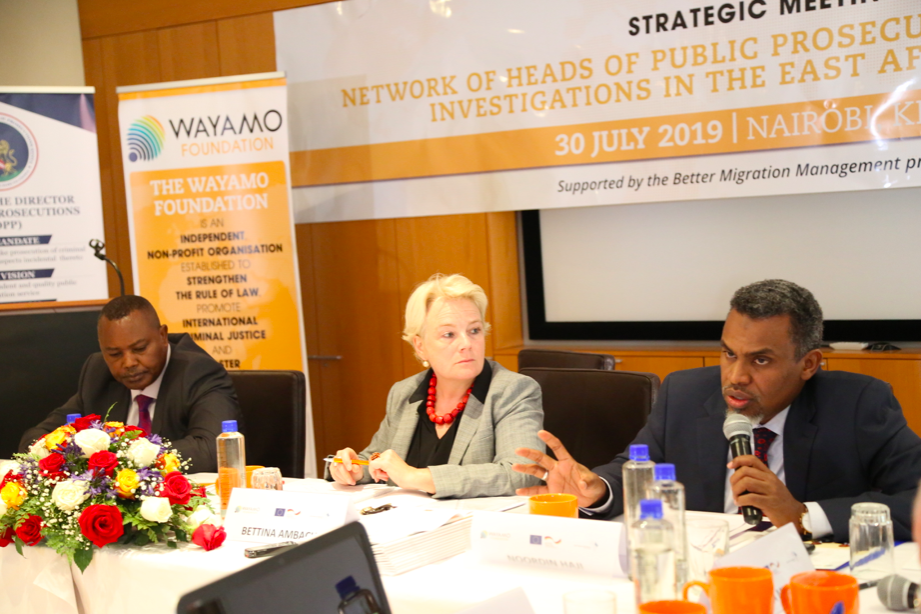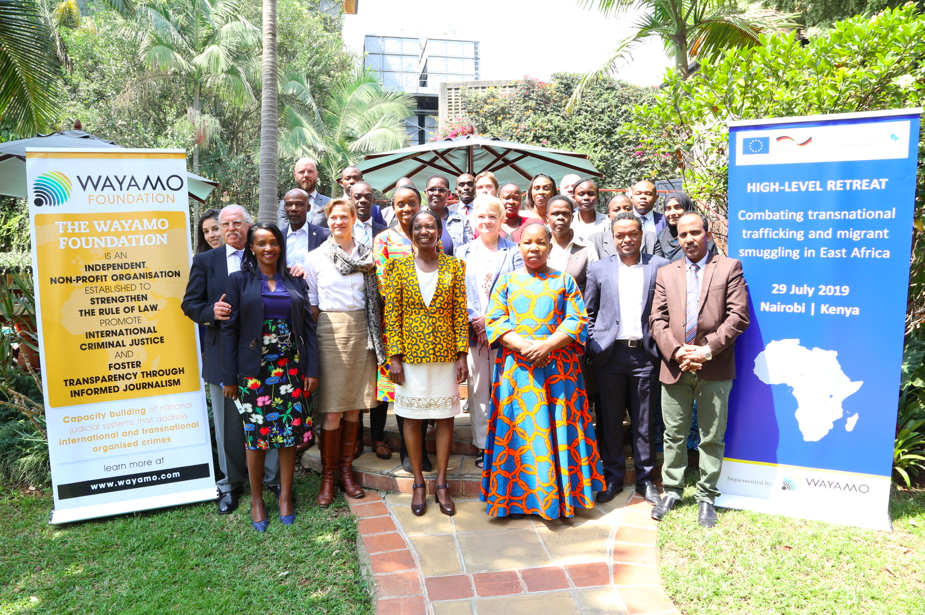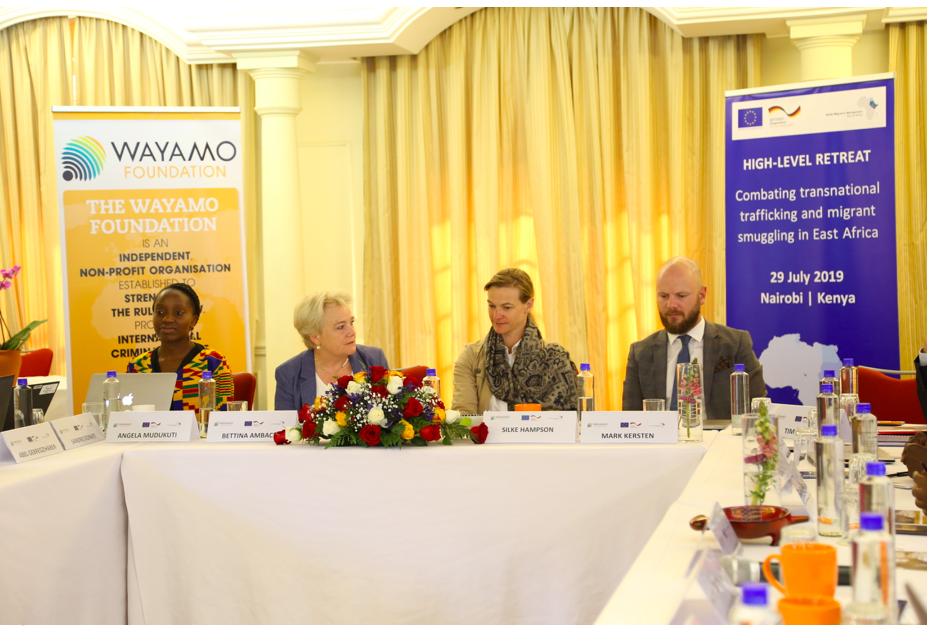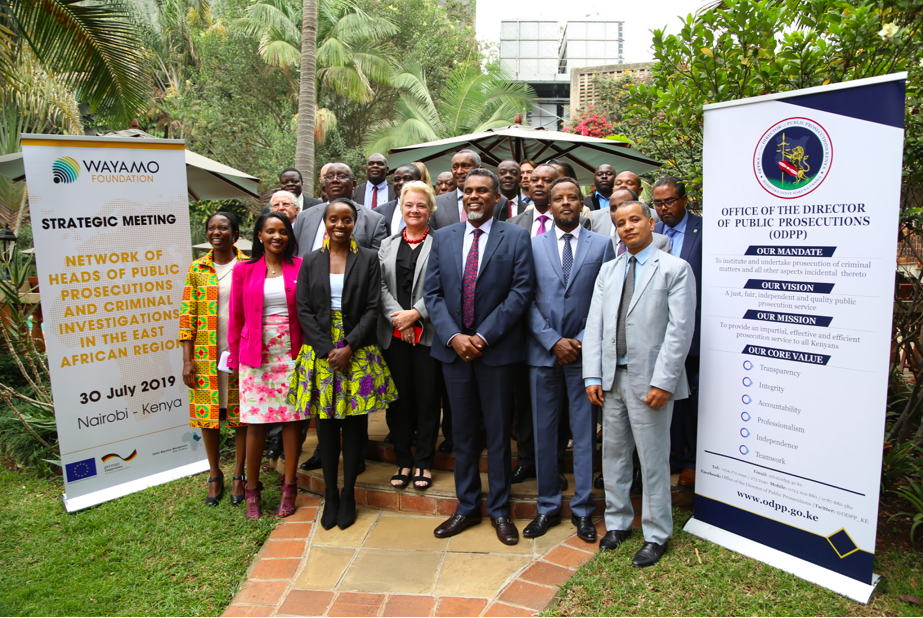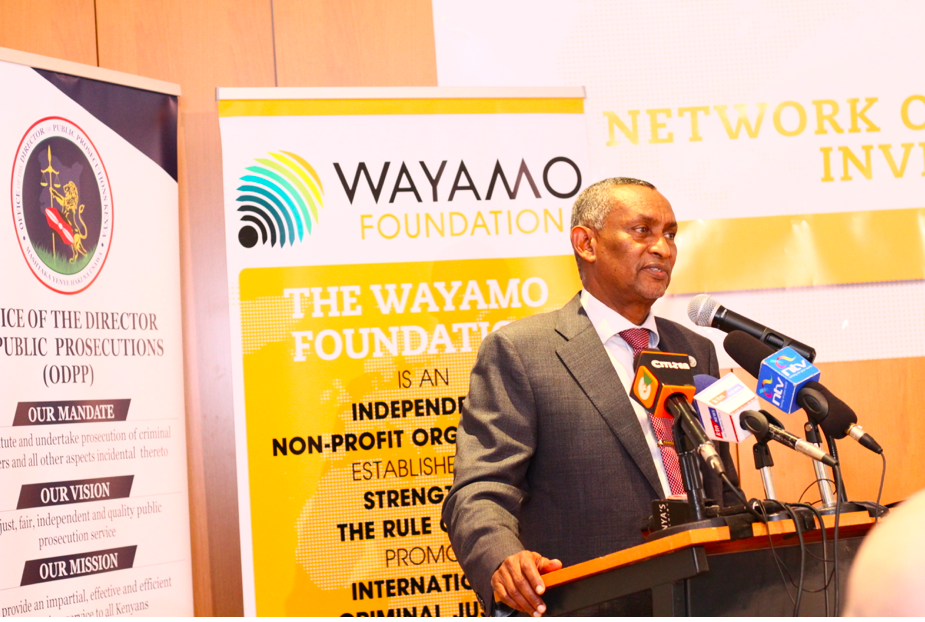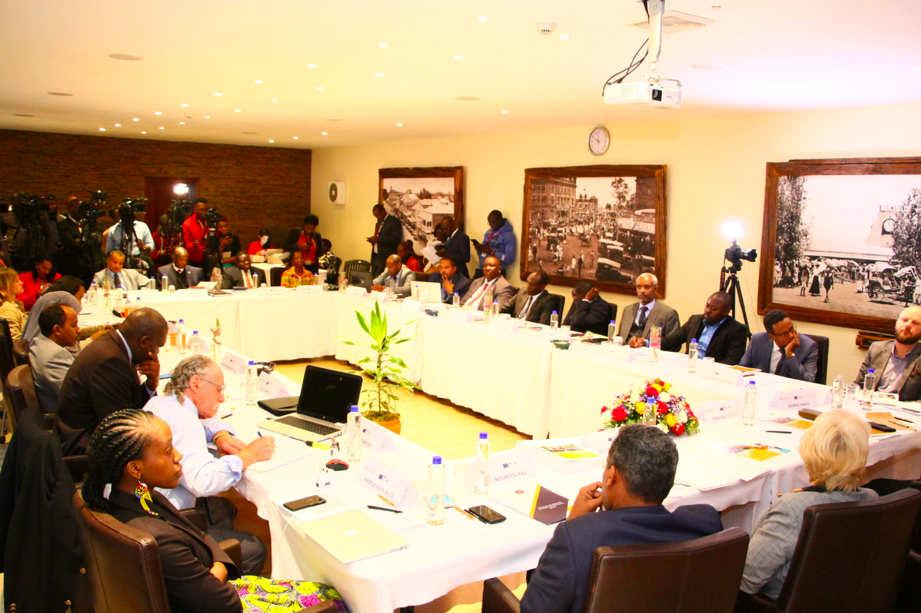Wayamo resumes its work in East Africa with a high-level retreat on “Combating human trafficking” and a strategic meeting of the network of Heads of Public Prosecutions and Criminal Investigations in the East African region.
In continuation of its ongoing efforts to enhance the capacity of East African states to investigate and prosecute transnational human trafficking cases, as well as to strengthen regional cooperation amongst the region’s Investigation and Prosecution authorities, the Wayamo Foundation recently held back-to-back events in the Kenyan capital, Nairobi.
29 July 2019 High-level Retreat –Combating transnational trafficking and migrant smuggling in East Africa
The first of event was a high-level retreat bringing together the Heads of the Anti-trafficking Units from Kenya, Uganda, Rwanda, Tanzania, Djibouti, Ethiopia, South Sudan and Somalia to analyse the issue of trafficking from a regional perspective, propose improvements for judicial cooperation, and reflect on strategies to better address human trafficking and migrant smuggling cases.
The retreat’s stated aim was to enhance the capacity of East African states to investigate and prosecute transnational trafficking and migrant smuggling cases, strengthen inter-agency and cross-border collaboration in the region, as well as promote a regionally coherent approach to the fight against trafficking crimes.
After the formal opening of the event by Wayamo Director, Bettina Ambach and BMM Regional Coordinator, Silke Hampson, the participants heard four presentations given by experts in their respective fields.
Tim Ford, an international expert on Regional Law Enforcement in the Greater Horn of Africa and Yemen, spoke on the subject of: “Investigation and prosecution of human trafficking and migrant smuggling cases”. He urged the participants to think about “what needs to change” to effectively combat traffickingand emphasised the importance of a cohesive and coordinated investigative strategy, strategic partnerships, sensitisationto human rights implications and the use of available forensic capabilities.
Wayamo Deputy Director, Mark Kersten, followed the first session with a presentation on the topic of “Human trafficking as an international crime” where he covered the intricate links between transnational organised crime and international crimes including examples from East Africa and beyond.
Commandant Agnes Igoye of the Uganda Immigration Training Academy vividly described her hard-won experience combating human trafficking in East Africa including sharing her personal journey from the point of having to flee the Lord’s Resistance Army as a young girl, to her professional experience as an activist fighting trafficking, protecting victims and engaging with civil society and governments.
Sandro Donati of the UNODC Regional Office for Eastern Africa provided an overview of UNODC’s work in the region covering latest trends in Kenya, Uganda, Djibouti, Ethiopia, South Sudan and Somalia.
After Sandro Donati’s contribution, the participants took turns to discuss the most prevalent challenges that they were facing, the means available (legislative, political, technical, etc.) to address such challenges, as well as key lessons learnt.
The meeting ended on a constructive note with the development of concrete recommendations to improve anti-trafficking measures in the region, which were presented to the Directors of Public Prosecutions and Directors of Criminal Investigations present at the strategic Network meeting held the following day.
30 July 2019 Strategic meeting – Network of Heads of Public Prosecutions and Criminal Investigations in the East African Region
Following the retreat, the Directors of Public Prosecutions (DPPs), Directors of Criminal Investigations (DCIs) and Deputy Attorneys-General from Kenya, Rwanda, Uganda, Tanzania, Djibouti, Somalia and Ethiopia gathered for the fifth network meeting. The South Sudanese DPP was scheduled to join the meeting but due to a last-minute flight cancellation, he was unable to attend. The overall aim of the DPP and DCI network is to strengthen the rule of law by ensuring effective investigation and prosecution of complex crimes and intensifying inter-agency collaboration at the regional level.
The Network’s four main functions are to: act as an avenue for regional and cross-border collaboration and mutual legal assistance in international and transnational criminal cases; promote and encourage collaboration among investigators and prosecutors by following an inter-agency approach; serve as a think-tank and foster discussions about emerging crime patterns as well as a forum to share information and formulate strategies to counter new security threats; and develop effective training and capacity building programmes in order to strengthen the relevant crime units of the member countries.
The day began with an opening ceremony covered extensively by over twenty members of the Kenyan media. It comprised of welcoming remarks from Wayamo Director, Bettina Ambach, Kenyan DPP, Noordin Haji, Kenyan DCI, George Kinoti, and Special guest Ambassador (Eng) Mahboub Maalim, in his capacity as Executive Secretary of the Intergovernmental Authority on Development(IGAD). Members of the press were then given an opportunity to ask questions many of which were directed to the Kenyan DCI, George Kinoti and Kenyan DPP Noordin Haji.
Special Guest, Executive Secretary Mahboub Maalim provided a spirited address reminding the participants that leaders who use sovereignty arguments to limit regional integration should realise that “East Africans are all one people”. He highlighted that the Network contributes to regional integration and encourages institutional linkages, thereby falling in line with IGAD’s security strategy. Ambassador Maalim concluded by extending IGAD’s offer to host the next Network meeting in Djibouti towards the end of the year.
The meeting was then addressed by Agnes Igoye, Commandant of the Uganda Immigration Training Academy, who presented a series of recommendations developed by participants from the high-level anti-trafficking retreat held the previous day.
Following the presentations from Executive Secretary Mahboub Maalim and Agnes Igoye, representatives of the Network’s potential new members, Djibouti, Ethiopia, South Sudan and Somalia, were invited to give brief summaries of their experiences of “Tackling transnational organised crime in the region”. This was followed by an in-depth discussion on bilateral and regional cooperation in East Africa in the fight against international and transnational organised crimes as participants identified security threats and emerging crime patterns.
The final part of what had been an intensive and fruitful day was devoted to a brainstorming session on overcoming obstacles to regional cooperation, ensuring the Network’s sustainability, encouraging its geographical expansion and enhancing cross-border inter-agency collaboration. Participants agreed to immediately begin planning the next high-level Network meeting, on the theme of “strengthening regional cooperation” to be held in Djibouti towards the end of the year. The meeting will be accompanied by a detailed training workshop for East African prosecutors and investigators from specialised crime units to better equip them to effectively tackle transnational organised crime.
The events were funded by the Better Migration Management (BMM) programme. BMM is a regional, multi-year, multi-partner programme, funded by the EU Emergency Trust Fund for Africa and the German Federal Ministry for Economic Cooperation and Development. The programme’s overall objective is to improve migration management in the Horn of Africa and, in particular, to address the trafficking and smuggling of migrants within and from the region.

